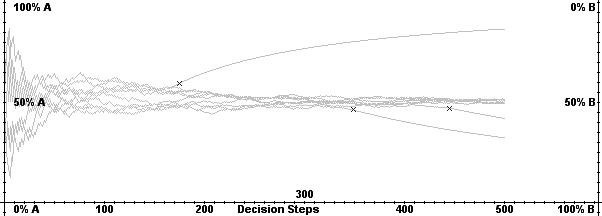If we say "e-learning is dead" (as I have recently) what does it mean beyond a rather attention-grabbing assertion? The deadness of anything is stasis. That's ironic in a way, because the cybernetics of living things is concerned with their maintenance of homeostasis; but necessarily in a living thing, that is a dynamic process. So when we say "e-learning is dead" we mean "it is static" (and there is no process to maintain its stasis because the process has nothing to act on). The next question is "what brings about stasis in social systems". The answer to that is "lock-in". The graph below based on Arthur's model of Lock-in using random-walks demonstrates the phenomenon using a 'lock-in barrier':
(the article from which this is taken: http://jasss.soc.surrey.ac.uk/11/1/4.html
Marc R.H. Roedenbeck and Barnas Nothnagel (2008) Rethinking Lock-in and Locking: Adopters Facing Network Effects, Journal of Artificial Societies and Social Simulation vol. 11, no. 1 4)(the article from which this is taken: http://jasss.soc.surrey.ac.uk/11/1/4.html
At lock-in, the variety of possible strategies drastically reduces. In a communication system of course, it's obvious to see how can amount to 'death': we run out of things to talk about, or endlessly talk about the same thing. The marriage breaks down, people get bored! Of course, one discussion finishes, and another one starts. So, people stopped talking about VHS vs Betamax...
If our history of "e-learning" is of a process of communication where there is increasingly less to talk about, how would that history be characterised? I think there have been a number of dynamics in the e-learning discussion that are interesting and have developed over time. First, there has been a 'technology' discussion, and the 'technology' discussion has affected almost all areas of life. There has also been an 'education' discussion, within which issues like participation, effectiveness, skills, etc have all played their role. Finally, there has been a political discussion - although for much of the last 10 years, the political discussion has been quite weak and taken a back-seat while the technology discussion and the education discussion get on with it. The dynamic between the education discussion and the technology discussion produced in the early days significant areas of difference: e-skills were not what they should be; institutional governance could benefit from technology; VLEs could help rationalise provision, etc. There was big push because there was a lot to talk about.
But now, education is locked into technology. It is as if the education discussion is a technology discussion - indeed, the worrying response of many managers in education is to reach for technology - whether that technology is a new system, or some new bureaucratic process - before they reach for teaching and learning (which is too woolly and difficult) And the lock-in produces some strange effects. The same discussions go round and round; individuals feel the danger of the lock-in and this has existential effects which can cause problems or pathologies within the institution. Projects are established to seek ways out of the crisis - but those projects are symptoms not cures. Individuals want to escape the lock-in - but they can't. Whatever they come up with (learning analytics, real-time institutions, even WebSockets) simply serves to strengthen the hold of the relationship.
The powerlessness of the political discussion has, I think, contributed to this situation. As Beck says, technology is "legitimated social change without political legitimation". And the "legitimated social change" was simply accepted as being outside politics. A healthy dynamic is between three principle areas of discussion - that can prevent the lock-in because there is always some 'interference' which disrupts the processes of lock-in. It is part of the ultrastability of social systems. With lock-in between technology and education, the danger is that the dynamic with the political discussion is either sidelined, or itself becomes party to the lock-in. That creates not only a lock-in crisis between technology and education, but between technology, education and politics. It is at that point we have successfully 'enframed' ourselves (in Heidegger's phrase)
But I'm more optimistic. I think a new dynamic of conversations is being established. There is:
- "technology-education" (which are now coupled)
- political economy
- and finally there is 'risk' or anxiety.
Those worrying about the future of learning technology are, I think, asking the wrong question. They should be thinking about the future of techno-education, its relation to global and local political economy and the impact of risk.


No comments:
Post a Comment